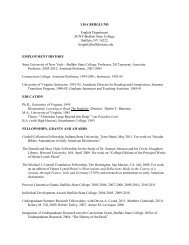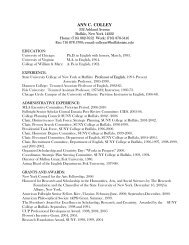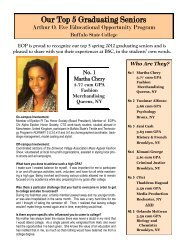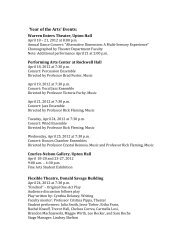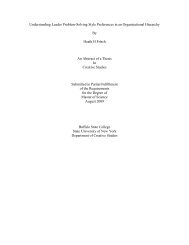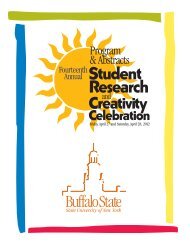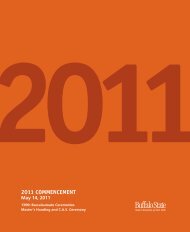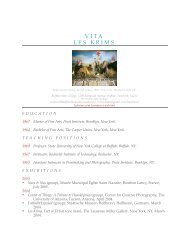POLITICS VERSUS SCIENCE: APPORTIONING ... - Buffalo State
POLITICS VERSUS SCIENCE: APPORTIONING ... - Buffalo State
POLITICS VERSUS SCIENCE: APPORTIONING ... - Buffalo State
Create successful ePaper yourself
Turn your PDF publications into a flip-book with our unique Google optimized e-Paper software.
when scientist assumes the role of politician. A successful politician is an effective and<br />
popular governor, while the scientist’s mettle is measured almost exclusively by research<br />
output, or discovery. So while the people and their government evaluate the politician,<br />
the academy shapes the scientist’s reward structure. Politicians, seeking to satisfy the<br />
public and the government they serve, ask: “How much will the regulation cost the<br />
taxpayers? What constituencies will be impacted? How will they be impacted? Will<br />
government be held responsible for food crises?” Scientists, trained to think in terms of<br />
chance (probability theory) and generalizability (the goal of science) ask, “How can we<br />
reduce the probability of incidences of undesirable outcomes?” trained as they are that<br />
the probability of a Type I error can be reduced, never eliminated.<br />
This tension between politicians and scientists is hardly a new concept: it grew to<br />
a virtual religion in the 19 th Century Saint-Simonian (and primarily, European)<br />
movement of "New Christianity," which called for government by a theocracy of<br />
scientists, engineers, and philosophers. More recently, EU scholars have considered the<br />
impact of this different orientation of scientists and politicians in policymaking.<br />
Accordingly, Majone (1989, 4) writes, “When science, technology, and public policy<br />
intersect, different attitudes, perspectives, and rules of argument come into sharp<br />
conflict.” Joerges (2001, 3) asks us to consider, “To what degree should, could, or does<br />
‘expertise’ replace legal, political and ethical criteria?” Identifying three domains—<br />
scientific, environment, market—in EU biotechnology policy, Patterson (2000, 318)<br />
finds “there is little overlap,” between scientists arguing for demonstrated risks, on one<br />
side, and consumers, politicians, and environmentalists on the other, advocating the<br />
promulgation of regulations based on potential risks. The 2003 outbreak of Foot and<br />
4




